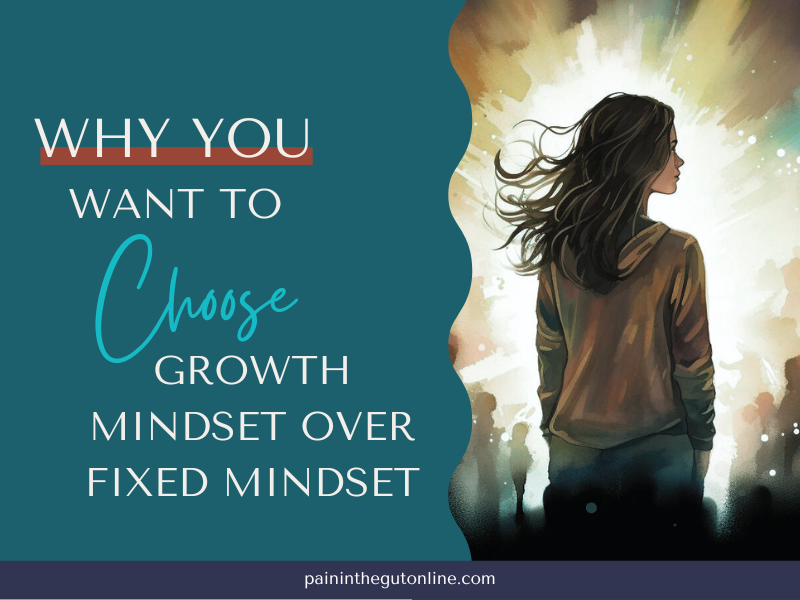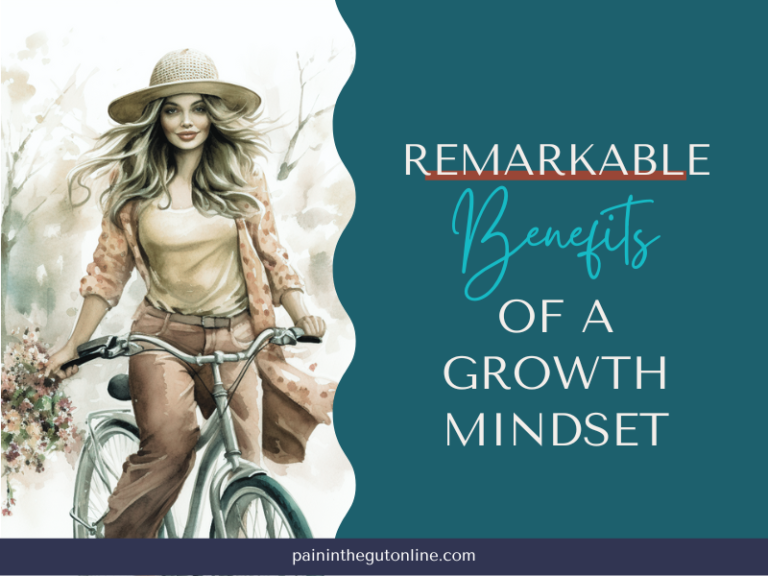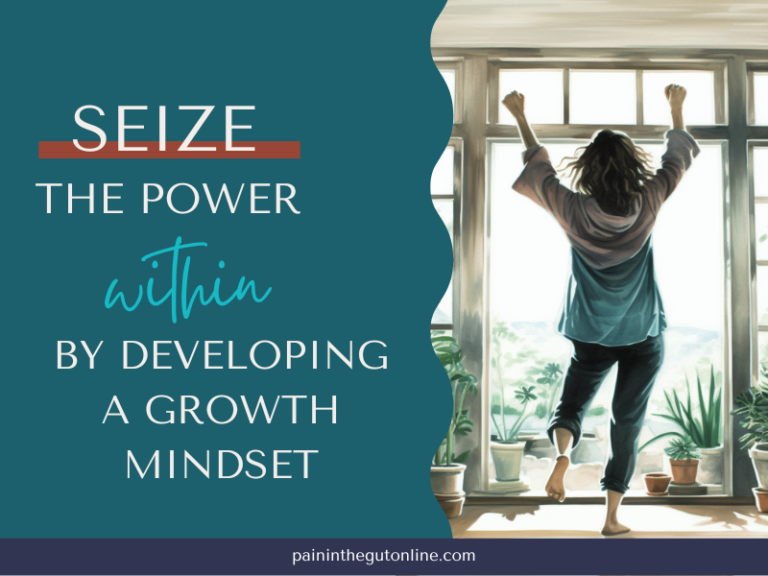GROWTH MINDSET OVER FIXED MINDSET
11 min read/ 2,427 words
Choose growth over stagnation! Discover the power of a growth mindset to achieve health goals and transform your life. Let’s explore the reasoning behind why you want to choose growth mindset over fixed mindset to improve your life.

Table of Contents
Understanding Mindsets
When it comes to achieving your health goals, your mindset plays a crucial role in determining your success. Two common mindsets that can impact your approach to health goals are the growth and fixed mindsets.
Growth Mindset Over Fixed Mindset
A growth mindset is characterized by the belief that abilities and intelligence can be developed through effort and learning.
People with a growth mindset tend to believe they can improve their health over time by consistently adopting healthy habits. They see setbacks as opportunities for learning and growth and are more likely to persist in the face of challenges.
On the other hand, a fixed mindset is characterized by the belief that abilities and intelligence are fixed traits that cannot be changed.
Those with a fixed mindset may view their health as something predetermined and beyond their control. They may give up easily when faced with challenges or setbacks, believing that their efforts will not make a significant difference.
Research has shown that individuals with a growth mindset tend to achieve higher levels of accomplishment compared to those with fixed mindsets.
For example, students with a growth mindset persist despite failure, viewing it as a steppingstone in the learning process. This persistence often leads to higher levels of achievement than their peers with fixed mindsets, who may plateau early and achieve less than their full potential (GCU.edu).
Impact of Mindset on Health Goals
Your mindset can significantly impact your approach to health goals.
People with a growth mindset are more likely to embrace challenges and persist in the face of setbacks. They see effort as the path to mastery and are open to learning from criticism and feedback. They also find inspiration in the success of others, seeing it as a source of motivation and learning opportunities.
However, people with a fixed mindset may avoid challenges or give up easily when faced with difficulties. They may view effort as fruitless and ignore feedback, missing out on valuable opportunities for growth and improvement. They, too, may feel threatened by the success of others, which can hinder their own progress and motivation.
By developing a growth mindset, you can cultivate a positive attitude towards your health goals.
Developing a growth mindset involves recognizing and reframing negative beliefs, embracing challenges, seeking feedback, and fostering a love of learning and continuous improvement.
With a growth mindset, setbacks become learning opportunities, and you can set realistic and challenging goals while celebrating your progress along the way.
In the following sections, we will explore the characteristics of growth mindset over fixed mindset in more detail, as well as the benefits of adopting a growth mindset in achieving your health goals.
The Characteristics of a Growth Mindset
When it comes to achieving your health goals, adopting a growth mindset can make a significant difference in your progress and success.
A growth mindset is the belief that your abilities and intelligence can be developed and improved through effort, learning, and perseverance.
A fixed mindset is the belief that your abilities and intelligence are fixed traits that cannot be changed (Ness Labs).
Let’s explore the key characteristics of a growth mindset and how they can impact your health goals.
Embracing Challenges and Persistence
Individuals with a growth mindset tend to embrace challenges rather than avoid them. They see challenges as opportunities for growth and improvement, understanding that overcoming obstacles can lead to personal development and increased resilience.
When faced with a setback or difficulty, those with a growth mindset persist and find ways to overcome the challenge (American University School of Education).
In the context of your health goals, this means not shying away from difficult exercises or healthy habits. Embrace the challenges that come your way, whether trying a new workout routine or making dietary changes and stay persistent in your efforts.
Effort as the Path to Mastery
A growth mindset recognizes that effort is essential for mastery and improvement.
People with a growth mindset understand that their abilities can be developed through consistent effort and practice. They view challenges as opportunities to learn and grow rather than indicators of their limitations.
This perspective allows them to approach their health goals with a sense of commitment and dedication. They understand that progress may not always come easily or quickly, but with continued effort, they can achieve their desired outcomes.
Learning from Setbacks and Feedback
In a growth mindset, setbacks and feedback are seen as valuable learning opportunities.
Those with a growth mindset view setbacks as temporary obstacles that can be overcome with the right approach and mindset. They analyze their setbacks, identify areas for improvement, and adjust their strategies accordingly.
They seek feedback from others, recognizing that constructive criticism can provide valuable insights for growth and development.
When it comes to your health goals, this means being open to feedback from healthcare professionals, trainers, or even supportive friends and family. Use setbacks and feedback as stepping stones to refine your approach and make continuous progress.
By embracing challenges, recognizing the importance of effort, and learning from setbacks and feedback, you can cultivate a growth mindset that propels you toward achieving your health goals.
Remember, developing a growth mindset is a journey that requires self-reflection and a willingness to challenge your existing beliefs. Embrace the process, stay committed to your goals, and celebrate every small victory along the way.
With a growth mindset, you’ll find yourself more motivated, resilient, and equipped to overcome any obstacles that come your way.
The Characteristics of a Fixed Mindset
When it comes to achieving your health goals, it’s important to understand the characteristics of a fixed mindset.
A fixed mindset is a belief system that can hinder your progress and limit your potential. By recognizing these characteristics, you can work towards shifting your mindset towards a more growth-oriented perspective.
Avoidance of Challenges and Giving Up Easily
One characteristic of a fixed mindset is the tendency to avoid challenges and give up easily.
Those with a fixed mindset may feel uncomfortable stepping outside of their comfort zones and taking on new or difficult tasks. They may fear failure and equate it with a lack of ability. This fear of failure can prevent them from pursuing their health goals and exploring new opportunities for growth.
Instead of embracing challenges, they may choose to stay within their safe and familiar routines.
Viewing Effort as Fruitless and Ignoring Feedback
Individuals with a fixed mindset tend to view effort as fruitless and may underestimate the power of hard work and dedication.
They may believe that their abilities and intelligence are fixed traits, leading them to think that putting in effort is unnecessary.
This mindset can hinder their progress and prevent them from reaching their full potential. They may be resistant to feedback and view it as a personal attack. They may struggle to accept constructive criticism and may become defensive when their flaws or weaknesses are pointed out.
Feeling Threatened by the Success of Others
Another characteristic of a fixed mindset is feeling threatened by the success of others.
People with a fixed mindset may compare themselves to others and feel inadequate when others achieve success. They may perceive the success of others as a reflection of their own shortcomings, leading to feelings of jealousy and insecurity.
This comparison mindset can hinder their growth and prevent them from building supportive relationships with others who could help them on their health journey.
By understanding the characteristics of a fixed mindset, you can begin to identify these patterns in your own thinking and take steps to shift toward a growth mindset.
Developing a growth mindset can help you embrace challenges, view effort as a valuable tool for growth, and celebrate the success of others as inspiration for your own progress. For more information on developing a growth mindset, check out our article on developing a growth mindset.
The Benefits of Growth Mindset Over Fixed Mindset
When it comes to setting and achieving health goals, adopting a growth mindset can have a powerful impact on your journey.
A growth mindset believes that abilities can be improved through effort and learning, while a fixed mindset believes that abilities are fixed traits that cannot be changed (Ness Labs). By embracing a growth mindset, you can unlock several benefits that can propel you toward success in your health journey.
Increased Motivation and Resilience
One key benefit of a growth mindset is increased motivation and resilience.
When you approach your health goals with a growth mindset, you view setbacks and challenges as opportunities for growth rather than signs of failure. Rather than giving up when faced with obstacles, you persist and find ways to overcome them.
This mindset helps you stay motivated and bounce back from setbacks, allowing you to stay focused on your health goals.
Better Performance and Achieving Goals
A growth mindset also has a positive impact on your performance and ability to achieve your health goals.
With a growth mindset, you believe that effort and learning are key to mastery. This belief drives you to put in the necessary work, seek out knowledge, and continuously improve.
You understand that progress takes time and are willing to invest the effort required to reach your health goals. As a result, you are more likely to see progress and achieve the outcomes you desire (Ness Labs).
Stepping Outside of Comfort Zones
Stepping outside of your comfort zone is essential for growth and personal development.
With a growth mindset, you are more inclined to take risks and try new approaches to improve your health. You embrace challenges as opportunities to learn and expand your abilities.
By pushing the boundaries of what you are comfortable with, you open yourself up to new possibilities and experiences. This willingness to step outside of your comfort zone can lead to breakthroughs and accelerated progress in your health journey.
Cultivating a growth mindset can help you harness the power of increased motivation, resilience, and better performance to propel yourself towards achieving your health goals.
Remember, developing a growth mindset is a process that involves reframing challenges, replacing fixed mindset thoughts, and embracing failures as learning opportunities (Ness Labs). With this mindset, you can overcome hurdles, stay motivated, and continually improve your health and well-being.
Developing a Growth Mindset
To cultivate a growth mindset over fixed mindset, it’s essential to develop certain habits and practices that help you shift from a fixed mindset to a growth mindset.
Here are three key strategies to help you develop a growth mindset:
1. Recognizing and Reframing Negative Beliefs
The first step in developing a growth mindset is recognizing and challenging negative beliefs and self-limiting thoughts.
Those with a fixed mindset often believe that their abilities are fixed and cannot be changed. However, by acknowledging and reframing these fixed mindset thoughts, you can start to embrace the idea that your abilities and skills can improve through effort and learning.
When you catch yourself thinking negatively or doubting your abilities, challenge those thoughts by replacing them with positive and growth-oriented statements.
For example, instead of saying, “I’m not good at this,” reframe it as “I may not be good at this yet, but with practice and effort, I can improve.”
By consciously reframing negative beliefs, you can open yourself up to new possibilities and opportunities for growth.
2. Embracing Challenges and Seeking Feedback
Another crucial aspect of developing a growth mindset is embracing challenges and seeing them as opportunities for growth.
Instead of avoiding difficult tasks or giving up easily, challenge yourself to step out of your comfort zone and take on new challenges (Ness Labs). Recognize that facing challenges can lead to valuable learning experiences and personal development.
Seek feedback from others and be open to constructive criticism.
Feedback provides valuable insights and perspectives that can help you improve and grow. Embrace feedback as an opportunity to learn and develop your skills rather than viewing it as a personal attack.
You can accelerate your progress and development by actively seeking feedback and incorporating it into your growth journey.
3. Fostering a Love of Learning and Continuous Improvement
A key characteristic of a growth mindset is a love of learning and a belief in the power of continuous improvement.
Embrace the mindset that you can always learn and develop new skills, regardless of your starting point (Ness Labs). Cultivate a curiosity about the world around you and seek opportunities for personal and professional growth.
Engage in activities that promote learning, such as reading books, attending workshops, taking online courses, or participating in growth mindset activities.
Adopt a proactive approach to your own development, setting goals and striving to improve yourself in various areas of life.
Fostering a love of learning and continuous improvement will better equip you to adapt to challenges, seize opportunities, and reach your full potential.
Developing a growth mindset takes time and consistent effort. It requires a shift in thinking and a willingness to embrace challenges, seek feedback, and continuously learn and develop.
By implementing these strategies into your daily life, you can cultivate a growth mindset that will propel you toward personal growth, resilience, and success.
Embracing the Process and Celebrating Progress
In a growth mindset, the focus is not solely on the end result, but also on the process itself.
Embrace the journey towards your health goals, appreciating the small victories and lessons learned along the way.
Understand that sustainable progress takes time and effort rather than fixating on instant gratification or immediate results.
Celebrate your progress, no matter how small, to maintain motivation and reinforce positive habits.
Did you make it to the gym three times this week? Celebrate that commitment to regular exercise. Did you choose a nutritious meal over an unhealthy option? Acknowledge the positive choice you made for your health.
These small celebrations help to reinforce your commitment to your health goals and keep you motivated to continue on your journey.
By cultivating growth mindset over fixed mindset in your health goals, you can view setbacks as learning opportunities, set realistic and challenging goals, and embrace the process while celebrating progress.
Remember, developing a growth mindset is a continuous process that requires effort and self-reflection. With time and practice, you can transform your approach to health and achieve lasting results.






